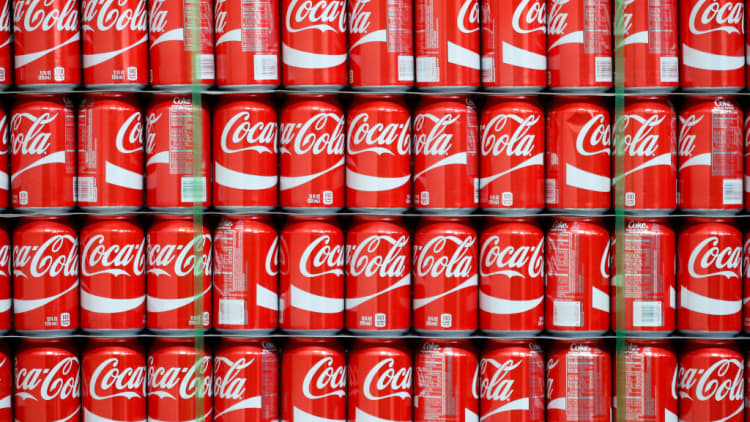
Amid a shrinking market for sugary, carbonated beverages, Coca-Cola delivered earnings on Wednesday that topped estimates on the top and bottom lines, showing its ability to manage industry headwinds by focusing on prices and newer products like Coca-Cola Zero Sugar.
Here's how the company did in the third quarter compared with Wall Street estimates from Thomson Reuters:
- Adjusted EPS: 50 cents vs. 49 cents expected.
- Revenue: $9.08 billion vs. $8.72 billion expected.
The Atlanta beverage giant reported net revenue of $9.08 billion, down 15 percent from the year-ago period, but ahead of analysts' expectations of $8.72 billion. Coke pointed to its refranchising efforts to explain part of the revenue decline.
Total unit case volume, a metric that strips out the impact of foreign exchange and pricing, was even. Coke offset its flat volume by raising prices and selling more of its expensive products.
This mix was particularly impactful in Latin America, where Coke boosted sales by 10 percent amid a 3 percent drop in volume. It reported a 6 percent organic revenue growth in the region for the quarter.
In North America, volume was flat, in Europe, the Middle East and Africa it was up 1 percent and in Asia Pacific it was up 3 percent.
Net income grew to $1.45 billion, up from $1.05 billion in the year-earlier quarter. Coke has been carrying out a cost-cutting program that has included refranchising its bottling operations and, in April, a 20 percent reduction in its workforce.
Excluding asset impairment and restructuring costs, Coke earned 50 cents per share, up 2 percent from a year earlier and ahead of analysts' estimates of 49 cents a share.
Coke shares edged slightly lower in premarket trading.
Innovation
In reaction to shifting consumer preferences, Coke has focused on innovation and acquisitions. These include its expansion into ready-to-drink tea and coffee, its launch of Coca-Cola Zero Sugar and its acquisition of Topo Chico.
Coca-Cola Zero Sugar, which Coke launched in the U.S. this August, doubled its volume growth this quarter from last year, the company said. By the first quarter of next year, Coke plans to introduce Coca-Cola Zero Sugar globally.
By volume, its juice, dairy and plant-based beverages, as well as its tea and coffee drinks, grew 1 percent. Soda stayed flat, and water and sports drinks dropped 1 percent
"I am encouraged with our progress and results in the quarter," said James Quincey, Coke's president and CEO. "Our performance reflects the strength of an organization that is focused on delivering against its financial commitments while also making substantial structural and cultural changes."
Coke's apparent success with innovation in North America comes in contrast to struggles shown by its competitor PepsiCo.
Pepsi last quarter slashed its full-year outlook as sales in the region dropped, due to slowing sales of Gatorade and in convenience stores broadly. It blamed the latter, in part, on an over-emphasis of its newer brands the expense of legacy products.
"We think Coke continues to do a good job driving relevancy with consumers and leveraging innovation and mix to drive solid pricing growth," said Bonnie Herzog and analyst at Wells Fargo.
Still, Herzog cited weakness in beverage volume as a continuing point of concern.
For the year, Coke expects earnings to be within a range of flat to down 2 percent from $1.91 a share in 2016. It anticipates organic revenue to grow 3 percent.


